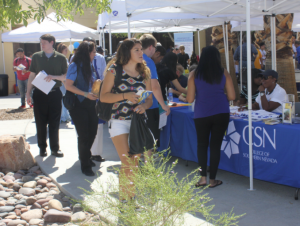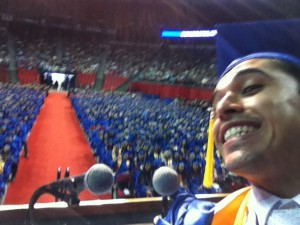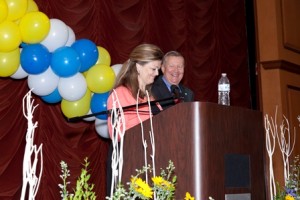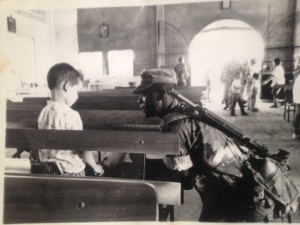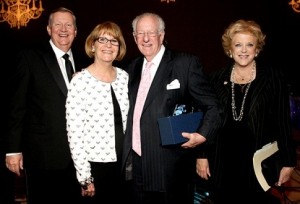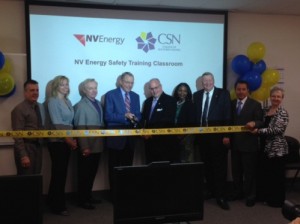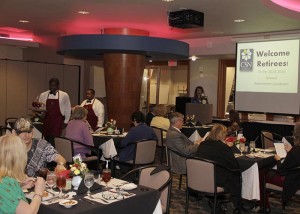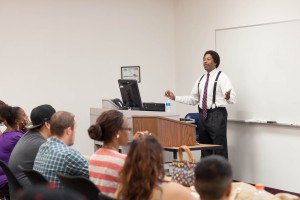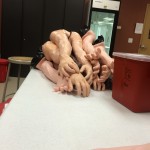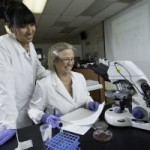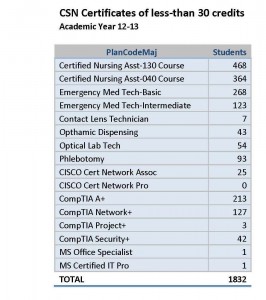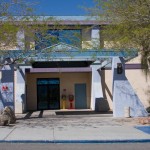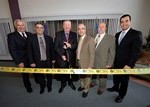Greetings! As this academic year winds down, there is much to report to you in many areas of the College.
Phi Theta Kappa
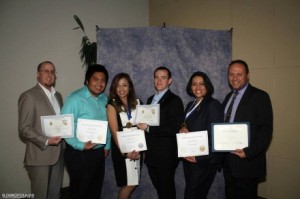
CSN PTK Students
On March 28, the Nevada/California Region of Phi Theta Kappa held its Spring Conference and Award Ceremony at the California Polytechnic State University campus. CSN’s chapter, Alpha Xi Beta, earned six awards that evening for their diligent work in the 2013 calendar year. The awards are as follow:
- Five Star Level
- Honors In Action Award, 2nd place in Theme 6
- 2013 Yearbook Award, 2nd place
- Regional Project-Financial Literacy (Education in a Financial Context)
- Regional Project-Make A Difference Day (Downtown Las Vegas Dynamos Clean Up)
- Regional Project-Community Project (Exposure to Global Culture & Food)
Congratulations to the student officers of 2013 for leading the chapter in another successful year.
Minority Serving Institution
This month, CSN received federal designation as a Minority Serving Institution under the Asian American, Native American and Pacific Islander-Serving Institutions (AANAPISI) category.
CSN is proud to be a Minority Serving Institution and will celebrate this achievement at every opportunity. CSN is a diverse institution and the more underrepresented students who succeed at CSN, the more we can change longstanding achievement gaps that impact our neighbors, friends and family. This reflects the college’s service to our increasingly diverse community and will allow us to compete for federal grants and other alternative funding to support all of our students.
CSN invited public stakeholders to attend a Campus Conversation today at the Charleston campus in for a discussion about what CSN’s new designation as a Minority Serving Institution means for the college community. A second Campus Conversation will take place at the Henderson campus on Wednesday, April 30, at 9 a.m. in C-105. We will be rescheduling the Cheyenne conversation in the near future.
Minority Serving Institutions include Historically Black Colleges and Universities (HBCUs), Hispanic Serving Institutions (HSIs), Tribal College and Universities (TCUs), and most recently the AANAPISI category. Colleges designated as AANAPISIs have student bodies made up of more than 50 percent low-income or Pell Grant eligible students and at least 10 percent of students, who are Asian American, Native American and Pacific Islander.
Legislative Preparations for 2015
On April 16, CSN hosted representatives from the Governor’s Budget Office, Legislative Counsel Bureau, and State Public Works Board. Four topics were covered: 1) the institution’s operating and capital budget priorities, 2) the need for a comprehensive financial strategy to address CSN’s deferred maintenance backlog, 3) the transforming efforts in student success, and 4) the value to students of facilities improvements at the Cheyenne and Henderson campuses.
Yearbook
As you may recall, due to schedule conflicts, we were not able to put on a Reflections of Success awards ceremony this year. Instead, we’re employing a recommendation from the Work Climate Committee and we’ve put together a booklet, titled Reflections of Success. This will be coming out in early May and be delivered to academic department offices and various units throughout the college. All of the Distinguished Award nominees and Excellence Award nominees are highlighted among other accomplishments. In lieu of an event, this is a way for us to communicate the successes of this academic year and showcase our amazing faculty and staff. Thanks to CSN Public Relations Specialist Richard Lake and Graphic Designer Sue Mitchell for their work in putting this together.
SB 391 Community College Governance Subcommittee Meetings
The two Community College Governance subcommittees met last week. On April 23, the Governance & Funding subcommittee met and heard from community college scholar Dr. Aims McGuinness, who presented on community college structures and reforms. His research can be found on the subcommittee’s site. He had high praise for systems like Tennessee, Kentucky, Louisiana and Hawaii for the cohesion that these structures were able to provide while at the same time representing diverse environments throughout the states and accountability for progress. In general, he did not advance local governance models as a recommended reform for Nevada to pursue. Thank you to the CSN faculty and students who attended and spoke during public comment. In addition, each of the community colleges presented on their processes for seeking grants. Our institutions are 90 percent successful in obtaining the grants we seek. This subcommittee will discuss structure further at its next meeting on June 9.
The Academic & Workforce subcommittee met the next day and heard from our partners in K-12 on some of our joint programs, including dual credit, community college high schools and AP coursework. The committee indicated an interest in developing strategies to increasing the fluidity, articulation/transfer and data sharing among K-12, community colleges and four-year institutions. They are interested in increasing similar cohesion between community colleges and businesses/ industry outside of current advisory board structures. The next meeting has not yet been scheduled but we will keep you posted as more information arises. We expect that they will narrow their focus to specific recommendations for reform. We see these meetings as a positive vehicle to affirm community colleges and our services to the state. Both subcommittees have discussed the potential for a state Workforce Fund, similar to the Knowledge Fund, previoulsy approved by the Legislature for the research institutions, to assist with our workforce development and training missions. The critical function of a need-based financial aid program to help ensure our students, who often don’t qualify for the Millennium Scholarship, can secure access to community colleges has also been discussed.
NSHE Executive Director of the Nevada College Collaborative
The Nevada System of Higher Education (NSHE) has named Frank Woodbeck, director of the Nevada Department of Employment, Training & Rehabilitation (DETR), as its new executive director of the Nevada College Collaborative. |
| In this new position, Woodbeck will be responsible for starting and leading the effort to improve efficiency and effectiveness among Nevada’s community colleges, including overseeing the shared services efforts among the three northern community colleges and opportunities for such efficiencies elsewhere throughout the state. He will also be working to enhance communication between higher education and the needs of businesses and industry for workforce development.CSN has long had a great relationship with Mr. Woodbeck and DETR and we look forward to working with him in his new capacity. He started April 21. |
Faculty Election Results:
Congratulations to Dr. Camille Naaktgeboren as the new Chair-elect of the Faculty Senate!
Chairs
|
Department
|
Chair-Elect
|
|
Math
|
Patrick Villa
|
|
International Languages
|
Ken Umland
|
|
Hospitality
|
Tom Rosenberger
|
|
AT
|
Dennis Soukup
|
|
Accounting, Finance, and Computer Office Technology
|
Robin Nelson
|
|
Health Related Professions
|
James Adams
|
|
Education
|
Dale Warby
|
|
Human Behavior
|
Kevin Rafferty
|
|
Media Technologies
|
Randy Becker
|
|
Physical Sciences
|
Peter Lanagan
|
|
Public Safety and Human Services
|
Rita Hayes
|
Senators
|
Department
|
Senator-Elect(s)
|
|
Math
|
Jennifer Gorman
|
|
AT
|
Mike Connolly, Nancy Snow
|
|
Arts and Letters
|
Ivonne Leavell, Sean Russell
|
Congratulations to new and continuing department chairs elected this spring and to the new faculty senators.
Legislative Budget Priorities
The Board of Regents met Friday to discuss budget priorities for the 2013-15 biennium that the system will put before the state at the next legislative session in 2015. The presidents have recommended as a top priority funding salaries at the full base and eliminating furloughs for all employees. This is in concert with a proposed request to increase the amount each institution receives per Weighted Student Credit Hour (WSCH). As many of you know, CSN and the other colleges and universities are no longer funded based on the number of students we enroll but on the number of courses and programs they complete. Much of the funding relies on the number of students who pass courses multiplied by a WSCH rate. We plan to ask the Legislature to increase the amount each school receives per WSCH to help us claw back from past budget cuts.
The Board also heard from all the presidents on the proposed tuition and fee increase plan for the next two biennia. CSN has been working closely with student government to create a detailed expenditure plan for the increase that supports access awards, additional support and FTEs and helps reduce lines and bottlenecks in serving students. More information about that plan was included in the March Chronicle. The Board will have a final vote on the tuition and fee increase during its June meeting.
Strategic Enrollment Planning
With the guidance of Noel Levitz, faculty, staff and administrators at CSN have been hard at work preparing a strategic enrollment plan for implementation this fall. This will lead to the creation of a plan to help CSN achieve long-term enrollment goals and improve student retention.
The Strategic Enrollment Plan is an arm of the college’s strategic plan that largely focuses on recruitment, retention and timely completion. The Strategic Enrollment Planning Committee has been busy making the rounds to different CSN committees and groups to communicate about how this plan is being developed and why.
Strategic Enrollment Planning recognizes that it is more cost-effective for the college to focus resources on retention of existing students, and retaining/effectively exiting students from degree programs than on consistently finding new students to replace those who drop out. Faculty and staff have gone through extensive data to evaluate CSN practices and those of our competition and are in the process of finalizing recommended action steps that we expect will streamline many of our matriculation and registration processes, more strategically target outreach, recruitment and marketing efforts and revolutionize retention practices. The latter will be assisted through CSN’s Achieving the Dream initiative, another all-college student success initiative.
If you have questions about the SEP plan or want more information, I encourage you to contact CSN Vice President of Academic Affairs Darren Divine. This has been an extensive effort involving academic and student affairs, faculty, staff and students and we look forward to discussing the action plan this fall.
CSN Connections are happening April 29, 30 and May 1 on all three campuses. Please encourage your students to attend and learn more about CSN student services and get ready for fall registration.
Priority registration for current students begins May 1 and open enrollment for new students begins on May 20.
Don’t forget, CSN’s 42nd Annual Commencement is Monday, May 19, at 6 p.m. at the Thomas & Mack Center at UNLV.
|
Questions from Faculty and Staff Members:
“Are we requiring recent high school graduates to take placement tests and see a counselor before they can enroll?”
CSN is implementing a mandatory matriculation policy for all 2014 Clark County High School
Questions I’ve received:
“Are we requiring recent high school graduates to take placement tests and see a counselor before they can enroll?”
CSN is implementing a mandatory matriculation pilot program for all 2014 Clark County School District high school graduates enrolling at CSN this fall. As part of the college’s student success initiatives, including Strategic Enrollment Planning and Achieving the Dream initiatives, we are notifying these students now that these 2014 graduates must complete the following 4 steps before they are allowed to register for classes.
- Apply for Admission
- Participate in Orientation
- Complete the math and English placement process (or submit official advanced placement or ACT/SAT Scores)
- Meet with an Advisor/Success Coach (either one-on-one or in an advising workshop)
In accordance with new matriculation procedures, Advisors/Success Coaches provide advising services to first-time college students without transfer credits, undecided students without a declared major, and Associate of General Studies (AGS) students only. Returning, continuing, and transfer students with declared majors seek academic advice from Academic School Counselors in their selected major/department.
Prospective students who have questions about this are encouraged to contact the CSN Call Center to speak with a college representative at 702-651-5555.
“Why did we pursue Minority Serving Institution status before pursing Hispanic Serving Institution status?”
The designations are based on historic academic full-time equivalent enrollment data from two years prior.
The college submitted an application to receive the designation as a Minority Serving Institution under the AANAPISI category this spring, based on fall 2011 enrollment data, which we knew met the federal criteria for this designation.
Next year, the college expects to be the first higher education institution in Nevada to be eligible to successfully apply for Hispanic Serving Institution status, based on fall 2012 enrollment data. Among other criteria, at least 25 percent of full-time equivalent students must be Hispanic to achieve the HSI designation.
“In the new fiscal year do we still have furloughs?”
Yes. The furloughs will continue over the course of the next fiscal year. However, eliminating the furloughs and enhancing benefits is a top legislative priority for CSN and the system in the upcoming legislative session. We have heard a lot of positive feedback from lawmakers on the elimination of furloughs and we will be asking you to contact your legislative representatives on this matter as we approach the session to reinforce the importance of making contracts whole again for all state employees.
“Has CSN completed work on salaries and benefits?”
We are not finished. In fact, there is much to do, constantly, on this topic. Several items are on the horizon: 1) full implementation of the salary compression (emphasis added) recommendations, 2) implementation of the merit pay plan for 2014-2015, 3) college-wide discussion (probably in the fall) on faculty ranks, and 4) work on adjusting the CC target from 78% of the university median to 83%. And then there is always the need to improve PEBP.
“What kind of rating do I need to receive on my evaluation to obtain a merit increase?”
Under the proposed policy that the Faculty Senate will consider next month, faculty (academic and professional) need an evaluation rating of satisfactory or better to be eligible for merit consideration. Put another way, employees who receive an unsatisfactory rating on evaluations are not eligible for merit consideration.
Fall Convocation will again be held at Texas Station on Aug. 18. We plan to announce the recipients of the Excellence Awards and the President’s Distinguished Employee of the Year awards and make a number of other exciting announcements. Please RSVP at rsvp@csn.edu
|
My next Chronicle to you will be after the SB 391 committee determines its recommendations for community colleges. This may be after graduation. Also, in the next Chronicle, I will be providing a list of new institutional policies approved by the Faculty Senate during this academic year. The Senate has revised faculty evaluation, merit pay, and student matriculation policies this year in a dedicated effort to improve CSN. I commend the Senators and the leaders of the Senate for all of the hard work. Now we need to get the word out.
Thank you all for your continuing and remarkable service to our students.
–Mike Richards
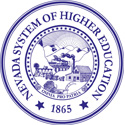 The Board of Regents, following instructions from the Governor’s Office, approved a 2015-17 budget request that includes full funding of furloughs, a merit pay recommendation, and an increase in the funding formula. We appreciate that the Board and Governor recognize the paramount importance of eliminating furloughs—finally. Also in the budget request are: 1) a Workforce Investment Fund, 2) beginnings of a need-based aid program for students, and 3) a STEM Challenge grant. We will work to help legislatures understand the importance of these budget priorities during the 2015 legislative session.
The Board of Regents, following instructions from the Governor’s Office, approved a 2015-17 budget request that includes full funding of furloughs, a merit pay recommendation, and an increase in the funding formula. We appreciate that the Board and Governor recognize the paramount importance of eliminating furloughs—finally. Also in the budget request are: 1) a Workforce Investment Fund, 2) beginnings of a need-based aid program for students, and 3) a STEM Challenge grant. We will work to help legislatures understand the importance of these budget priorities during the 2015 legislative session. 
